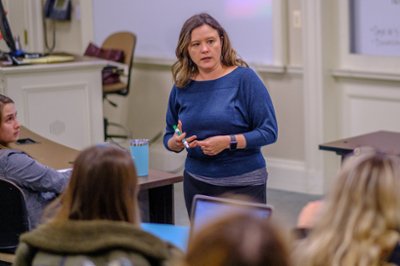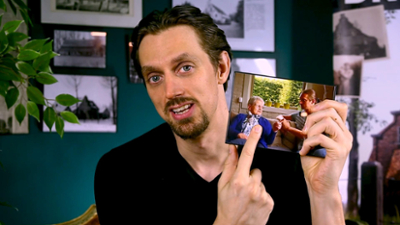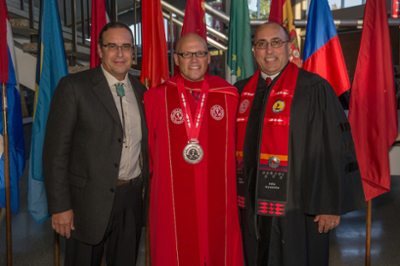
Word up! Newly coined terms, all with ties to Miami University, capture innovative spirit
By Margo Kissell, university news and communications
Gentelligence. Gaminiscing. Wiicinaakosioni, the Myaamia word for “be together.”
These newly coined terms all have ties to Miami University.
Gentelligence
Megan Gerhardt, a professor of management and leadership, originated the term “Gentelligence” — a business strategy focusing on how generational differences can be leveraged as a valuable type of organizational diversity.

Megan Gerhardt in class at the Farmer School of Business (photo by Scott Kissell).
Gerhardt — co-director of the William Isaac and Michael Oxley Center for Business Leadership and director of leadership development for the Farmer School of Business — studies generational differences in the workplace, as well as the impact of individual differences on motivation and leadership.
“I came up with the term of Gentelligence in 2017, just prior to my TEDx talk (Why I Love Millennials...and You Should Too). The term came from my belief that the way many organizations were viewing generational differences was unproductive, and my desire to change the lens from one that viewed generational differences as something negative to one that saw those differences as an opportunity,” Gerhardt said.
“Our research on best practices in managing other types of diversity make it clear that there can be strength in differences if they are managed well. I wanted to find a way to help leaders apply this kind of insight and intelligence to generations — thus, Gentelligence was created.”
Gentelligence was copyrighted in 2019. “It is now officially my trademarked term,” she said.
Her new book, Gentelligence: The Revolutionary Approach to Leading an Intergenerational Workforce is now available for pre-order and will be released next June. The book was co-authored with Miami alumni Jospehine Nachemson-Ekwall (Miami '18) and Brandon Fogel (Miami '18).
Gaminiscing
Bob De Schutter, the C. Michael Armstrong Professor of Applied Game Design, coined the term “gaminiscing” more than a year ago for the use of video game technology to share personal history.
His interactive digital game “Brukel” won a gold medal at the International Serious Play Awards 2019 in Los Angeles. It was recognized in the category “games for good,” designed for use in educational settings.

Bob De Schutter with an image of him and his Belgian grandmother, Bie Verlinden. The interactive digital game "Brukel" is based on her experiences (submitted photo).
“Brukel” recreates the narrative of a reminiscing elderly female World War II survivor and is based on the experiences of his Belgian grandmother Bie Verlinden. She was born and raised in the Brukel farmhouse.
“Gaminiscing is the use of game technology to archive and recreate personal oral history as an engaging experience. It's a combination of ‘games’ and ‘reminiscing,’” he said.
De Schutter noted that while there are games that are similar to documentaries in the sense that they are based on real life events as well as games in which a character's past is revealed through audio excerpts that the player uncovers while playing, “we could not think of games in which such audio excerpts are actually voiced by the people that lived through them in real life.”
He hasn’t sought a copyright on the term.
“I hope as many people as possible will start to gaminisce the stories of their loved ones, so I have no interest in ‘claiming’ it for myself,” he said. “It's been wonderful to see third parties use it and to meet people that told me that they are going to do a gaminiscing project of their own.”
Wiicinaakosioni
The Miami Tribe recently came up with wiicinaakosioni. Like some other words it has developed, it is used only in its relationship with Miami University.

Myaamia Center director Daryl Baldwin stands with Miami President Greg Crawford and Miami Tribe of Oklahoma Chief Douglas Lankford (photo by Scott Kissell).
Myaamia Center director Daryl Baldwin said it shows how the university’s relationship with the Miami Tribe of Oklahoma is becoming more institutionalized. The word is now the name of a new program, the Wiicinaakosioni Program for diverse prospective students.
“As for the meaning, I think it’s best to understand wiicinaakosioni as meaning 'being together (as in being a group with a shared experience),’” Baldwin said.
The Myaamia Center on Miami’s Oxford campus is the research arm for the Miami Tribe, which in 2018 received a prestigious national award recognizing its cultural heritage and language revitalization program. The work has resulted in the first generation in nearly 100 years learning to speak the Myaamia language.
This semester, 30 Myaamia students are enrolled at the university. To date, 95 students have earned undergraduate or graduate degrees (three students earned both), said Kara Strass, director of Miami Tribe Relations for the Myaamia Center.
“As we continue to create partnerships across campus, we have started using certain words/phrases in partnership with individual divisions," she said. "We have worked with them to understand the goals/values of their division and how they align with Myaamia values, and then decide on a word that exemplifies those values.”
Strass listed these other examples:
- neepwaantiinki: “learning from each other” — used to describe the relationship between Miami Tribe and Miami University.
- ayaakwaamisioni “striving” — used with Miami athletics to talk about how athletes are striving both on and off the field.
- tapaalintioni nahiteehioni “love and honor” — created as a translation for Miami’s Love and Honor phrase and has connotations around virtue, prudence, and wisdom.
Strass added, “The other things that we continue to create are words for Miami University places, like myaamia mihši-nipwaantiikaani kihkintoolaakani, which is our word for the Miami Seal. We have lots of other examples like residence hall, rec center, etc.”
“These are myaamia words that can be used broadly within a Myaamia conversation, but we use them as ways to build connections with divisions across campus.”
